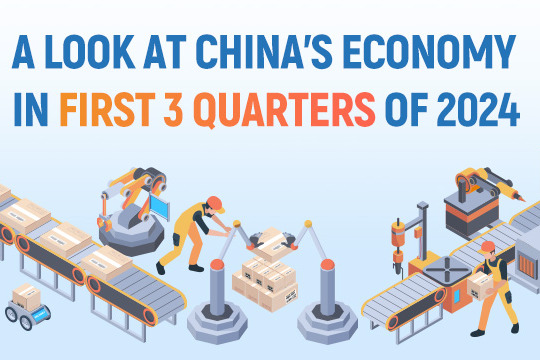More effective sci-tech financing urged
Expert: 'Mismatch' exists to some extent between funding tools and innovation sector


Zhang made the remarks at the 2024 Tsinghua PBCSF Global Finance Forum recently held in Hangzhou, Zhejiang province.
Tian Xuan, associate dean of Tsinghua University's PBC School of Finance, also stressed the significance of utilizing financial tools to empower sci-tech innovation and develop new quality productive forces at the forum.
"China's high-quality economic growth relies heavily on sci-tech innovation. The country needs to transform and upgrade traditional industries, as well as accelerate the development of strategic emerging industries," Tian said.
"Sci-tech innovation is an activity with a long life cycle, high uncertainty and high failure rate, but many investors focus more on short-term capital gains. The sector needs more 'patient capital' and investors should be more failure-tolerant," he added.
Tian said when it comes to sci-tech innovation, human capital is very important. Enterprises should develop favorable human resource policies and equity incentive plans, thus better motivating talent to innovate.
China also needs a "less active secondary market" to better protect sci-tech innovation-based enterprises. In such a secondary market, innovation-based enterprises can focus more on long-term innovation and will not be disturbed by short-term capital, he said.
"For example, we need strong defenses against hostile takeovers ...We need lower liquidity in shares, institutional investors to hold shares for longer periods, less analyst coverage and less frequent information disclosure (for them)," said Tian.
From a macroeconomic perspective, Tian said the country should strive to improve its legal environment by strengthening intellectual property rights protection, as well as better safeguarding private entrepreneurs' assets.
Efforts should also be made to improve the continuity, stability and consistency of policies, thereby injecting more impetus into the country's sci-tech innovation, Tian added.
Li Kang, former director-general of the Department of Laws and Regulations of the National Development and Reform Commission, said at the forum that innovation is the most important driving force for China's economic growth, and sci-tech innovation has become a major focus of strategic competition among countries.
Against such a backdrop, Li said investment in China's strategic emerging industries has grown rapidly, especially in high-end manufacturing, new energy, new materials and artificial intelligence. New areas of investment — such as humanoid robots and large language models — have also continued to emerge.
Moreover, private equity funds are an essential part of China's financial system and one of the most fundamental driving forces for sci-tech innovation. Together with the deepening reform of the country's capital market, the development environment of private equity funds has also improved continuously in recent years, Li said.
However, PE firms in China still face multiple challenges. Fundraising challenges continue to appear and market competition is intensifying. In addition, the reshaping of industrial and supply chains could bring new risks and PE valuations might be too high, said Li.
Li anticipates that this year China's PE investment sector will be further transformed and upgraded.
"Private equity firms should keep a close eye on macroeconomic trends, policies and market changes so as to determine where to invest and improve their investment strategies accordingly," he said.
Furthermore, quantum tech and life sciences are two major areas that warrant further attention, he added.




































